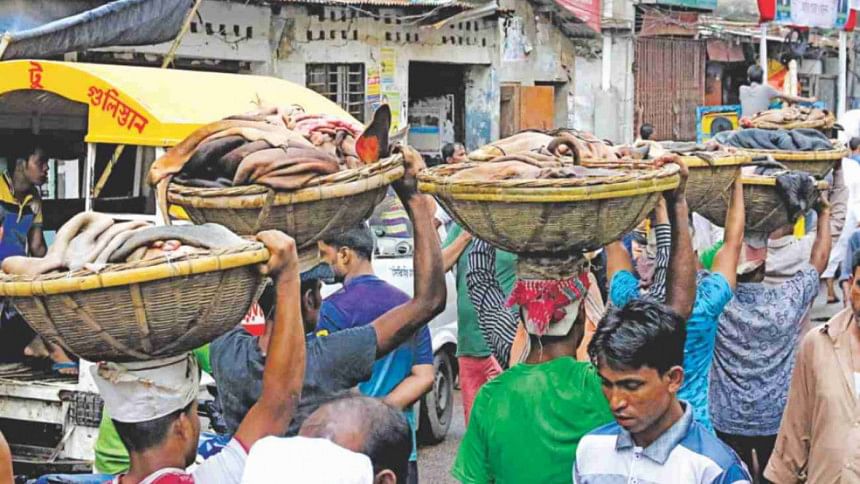Getting a rotten deal on rawhide

The recent debacle over the purchase of rawhides after Eid-ul-Azha raises some important concerns. The government had fixed the prices of rawhides of cows and buffaloes at Tk 45-50 per square foot in the capital city of Dhaka and Tk 35-40 elsewhere. The price of the rawhide of castrated goats was fixed at Tk 18-20 per square foot, while it was Tk 13-15 for that of non-castrated goats. This year, some 1 crore animals were sacrificed across the country. Forty-five percent of these animals were cows, bulls and buffaloes, according to rawhide traders.
All well and good. Comes Eid. Animals have been sacrificed. The first link in the supply chain of rawhides is the seasonal traders. They bought hides at varying prices, depending on the locality. When it came to selling them to merchants, the prices being quoted by wholesalers (merchants) were a pittance and that didn't even match the cost price of what the seasonal traders had paid for. In the midst of all this chaos, we were confronted with confusing statements coming from top ministers. That didn't help matters at all for the seasonal traders, because the merchants were not buying at the government-fixed prices. The authorities tell us that these rates were fixed after talking to merchants and tanneries.
We know from media reports that rawhides worth some Tk 100 crore have been dumped, which is a colossal loss for both traders and the economy at large. Every year, we see a scramble for rawhide collection because it is a source of income for many madrassas, where the sale of such rawhide brings in revenue. This year, thanks to lack of foresight coupled with mismanagement, the whole rawhide business model has been turned on its head. According to a report by The Daily Star on August 16, "some 35 percent or more than 1 crore pieces of rawhide were thrown away after this Eid, mainly due to slack market monitoring by the government, a syndication of some tanners and merchants, and merchants' lack of capital to buy rawhide."
We have had conflicting statements issued by the Bangladesh Tanners' Association (BTA) and the Bangladesh Hide and Skin Merchants' Association. According to the merchants' association, the tanners pay their dues in phases, and only cleared Tk 30-35 crores before Eid, which created a cash flow problem. The norm (according to the merchants) is for the tanners to pay "at least 40 percent of the dues every year before Eid-ul-Azha." Some merchants even stated that tanners only paid around five percent of the outstanding amount before Eid was celebrated on Monday last week. The merchants wanted the remainder of Tk 400 crore in unpaid dues (Tk 35 crore paid by tanneries). Tanneries, on the other hand, have refuted this allegation stating that around Tk 140 crore had been paid in advance. That still leaves more than Tk 250 crore in arrears, and whatever may be the actual figure in terms of unpaid dues, it still runs into hundreds of crores! This cash shortfall was bound to have an effect on procurement, and it did.
The other issue, of course, was lax monitoring by the government. As per a report published in this paper on August 18, a senior secretary at the commerce ministry had stated that there had been no such monitoring system in the past, "so we could not predict such a situation." He went on to say that things ought to get back to normal as tanneries had agreed to buy rawhides from August 19. The question that comes to mind is why we do not see any such mechanism in place as Eid is a festival that takes place every year. We would like to know if the government is thinking of conducting any study/survey about the quantity of rawhides that the tanneries have in stock (the ultimate destination for rawhides) prior to next year's Eid. Shouldn't there be a dedicated cell in the relevant ministries and departments that will collate up-to-date information about the probable number of animals that would be sacrificed during Eid, and also keep tabs on the entire supply chain of this trade—from sacrifice to sale to tanneries?
There is no use crying over spilled milk. The next Eid-ul-Azha is a year away and there is much work to be done in the meantime. In the absence of strict monitoring and law enforcement against attempted syndication or price manipulation, this sad episode will repeat itself next year. Merely talking about syndicates controlling prices is like blowing hot air. What the thousands of seasonal or small traders, who have suffered serious financial loss, want to see, quite justly, is legal action against these syndicate members so that they are discouraged from attempting to manipulate the prices of raw hide during next year's Eid.
Syed Mansur Hashim is Assistant Editor, The Daily Star.

 For all latest news, follow The Daily Star's Google News channel.
For all latest news, follow The Daily Star's Google News channel. 



Comments